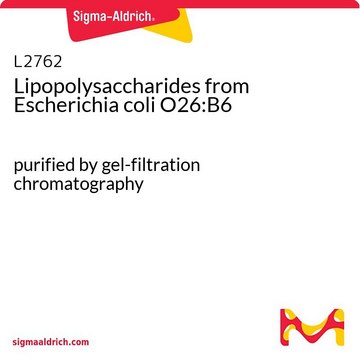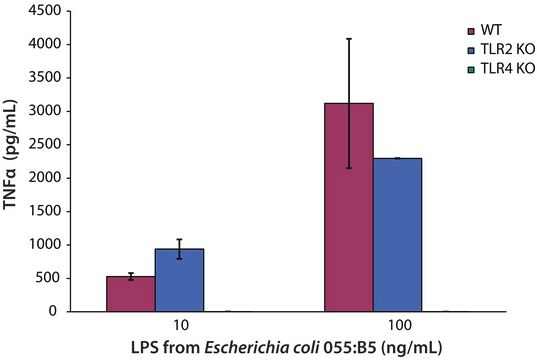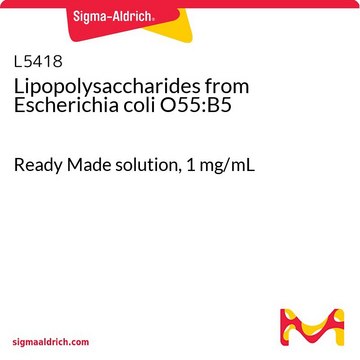L9023
Lipopolysaccharide aus Escherichia coli O55:B5
Detoxified
Synonym(e):
LPS
Anmeldenzur Ansicht organisationsspezifischer und vertraglich vereinbarter Preise
Alle Fotos(1)
About This Item
Empfohlene Produkte
Biologische Quelle
Escherichia coli (O55:B5)
Qualitätsniveau
Form
lyophilized powder
Versandbedingung
ambient
Lagertemp.
2-8°C
Suchen Sie nach ähnlichen Produkten? Aufrufen Leitfaden zum Produktvergleich
Allgemeine Beschreibung
This product is extracted from E. coli serotype O55:B5 and purified by chromatography. The source strain is CDC 1644-70. The lipid A moiety has been partially delipidated by alkaline hydrolysis. Removal of the fatty acid portions of lipid A results in a detoxified LPS with an endotoxin level about 10,000 times lower than that of the parent LPS.
Anwendung
Lipopolysaccharide (LPS) sind charakteristische Bestandteile der Zellwand von gramnegativen Bakterien. LPS und seine Lipid-A-Gruppe stimulieren Zellen des angeborenen Immunsystems durch den Toll-like-Rezeptor 4 (TLR4). TLR4 gehört zur Toll-like-Rezeptor-Proteinfamilie, die häufige Pathogen-assoziierte molekulare Strukturen (PAMPs) erkennt.
Biochem./physiol. Wirkung
Lipopolysaccharides (LPS) are localized in the outer layer of the membrane and are, in noncapsulated strains, exposed on the cell surface. They contribute to the integrity of the outer membrane, and protect the cell against the action of bile salts and lipophilic antibiotics.
Angaben zur Herstellung
Chromatographically purified; delipidized by alkaline hydrolysis
The product is soluble in water (5 mg/ml) or cell culture medium (1 mg/ml) yielding a hazy, faint yellow solution. A more concentrated, though still hazy, solution (20 mg/ml) has been achieved in aqueous saline after vortexing and warming to 70-80 oC. Lipopolysaccharides are molecules that form micelles in every solvent. Hazy solutions are observed in water and phosphate buffered saline. Organic solvents do not give clearer solutions. Methanol yields a turbid suspension with floaters, while water yields a homogeneously hazy solution.
The product is soluble in water (5 mg/ml) or cell culture medium (1 mg/ml) yielding a hazy, faint yellow solution. A more concentrated, though still hazy, solution (20 mg/ml) has been achieved in aqueous saline after vortexing and warming to 70-80 oC. Lipopolysaccharides are molecules that form micelles in every solvent. Hazy solutions are observed in water and phosphate buffered saline. Organic solvents do not give clearer solutions. Methanol yields a turbid suspension with floaters, while water yields a homogeneously hazy solution.
Signalwort
Danger
H-Sätze
Gefahreneinstufungen
Acute Tox. 2 Oral
Lagerklassenschlüssel
6.1A - Combustible acute toxic Cat. 1 and 2 / very toxic hazardous materials
WGK
WGK 3
Flammpunkt (°F)
Not applicable
Flammpunkt (°C)
Not applicable
Persönliche Schutzausrüstung
Eyeshields, Gloves, type N95 (US)
Hier finden Sie alle aktuellen Versionen:
Besitzen Sie dieses Produkt bereits?
In der Dokumentenbibliothek finden Sie die Dokumentation zu den Produkten, die Sie kürzlich erworben haben.
Kunden haben sich ebenfalls angesehen
Ding, H.F., et al.
Journal of Medical Microbiology, 31, 93-93 (1990)
Chong Liu et al.
World journal of gastroenterology, 15(46), 5843-5850 (2009-12-10)
To investigate the dysfunction of the immunological barrier of the intestinal mucosa during endotoxemia and to elucidate the potential mechanism of this dysfunction. Male Wistar rats were randomly distributed into two groups: control group and lipopolysaccharide (LPS) group. Endotoxemia was
Evangelos J Giamarellos-Bourboulis et al.
PloS one, 4(12), e8393-e8393 (2009-12-29)
The pandemic by the novel H1N1 virus has created the need to study any probable effects of that infection in the immune system of the host. Blood was sampled within the first two days of the presentation of signs of
James A Listman et al.
Molecular immunology, 45(9), 2667-2677 (2008-03-01)
The immediate early (IE) proteins of human cytomegalovirus (hCMV) have diverse roles in directing viral and host cell transcription. Among these is the ability of IE2 to induce transcription of the IL1B gene that codes for IL-1beta in monocytes. This
Sophie Van Linthout et al.
Journal of molecular medicine (Berlin, Germany), 89(2), 151-160 (2010-10-26)
The protective effects of high-density lipoprotein (HDL) under lipopolysaccharide (LPS) conditions have been well documented. Here, we investigated whether an effect of HDL on Toll-like receptor 4 (TLR4) expression and signalling may contribute to its endothelial-protective effects and to improved
Unser Team von Wissenschaftlern verfügt über Erfahrung in allen Forschungsbereichen einschließlich Life Science, Materialwissenschaften, chemischer Synthese, Chromatographie, Analytik und vielen mehr..
Setzen Sie sich mit dem technischen Dienst in Verbindung.




